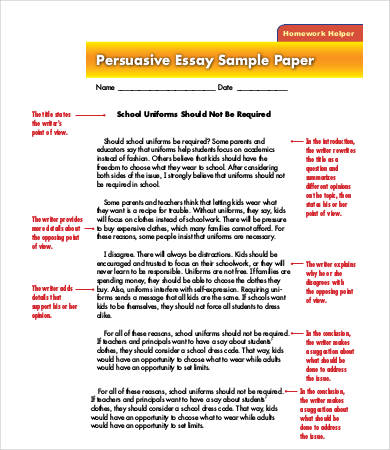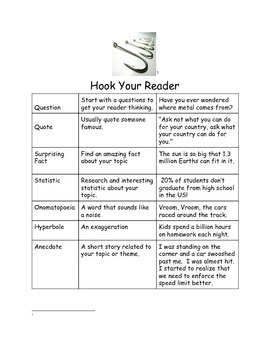
Prep Steps for Persuasive Essay Writing
· When forming a persuasive essay, students are required to conduct thorough research on the given topic, analyze it, and take a solid argumentative position. Then, with the help of logical arguments and convincing words, a student is expected to dispel biases and assure readers that there are no other correct points of view other than the author’s · TIP 1: Be careful not to introduce a new argument in the conclusion—there’s no time to develop it now that you’ve reached the end of your discussion! TIP 2: As with your thesis, avoid announcing your conclusion. Don’t start your conclusion with “in conclusion” or “to conclude” or “to end my essay” type statements · Here are some tips you can safely use for writing persuasive essays to make them more intriguing. Contact reader directly, ask a rhetorical question. Start with a quote, aphorism that best suits topic of your work. Refer to any outstanding situation, a scene, an interesting fact, but they should be related to underlying concept of the whole paper
Thoroughly research both sides
· How to Begin a Persuasive Essay (with Pictures) - wikiHow Academic Writing Essays How to Begin a Persuasive Essay parts 1 Brainstorming and Outlining Introduction Ideas 2 Crafting Your Hook 3 Introducing Your Topic and Thesis + Show 2 more Other Sections Questions & Answers Related Articles References Article SummaryViews: K · Here are some tips you can safely use for writing persuasive essays to make them more intriguing. Contact reader directly, ask a rhetorical question. Start with a quote, aphorism that best suits topic of your work. Refer to any outstanding situation, a scene, an interesting fact, but they should be related to underlying concept of the whole paper · TIP 1: Be careful not to introduce a new argument in the conclusion—there’s no time to develop it now that you’ve reached the end of your discussion! TIP 2: As with your thesis, avoid announcing your conclusion. Don’t start your conclusion with “in conclusion” or “to conclude” or “to end my essay” type statements

What Is a Persuasive Writing
· TIP 1: Be careful not to introduce a new argument in the conclusion—there’s no time to develop it now that you’ve reached the end of your discussion! TIP 2: As with your thesis, avoid announcing your conclusion. Don’t start your conclusion with “in conclusion” or “to conclude” or “to end my essay” type statements · How to Begin a Persuasive Essay (with Pictures) - wikiHow Academic Writing Essays How to Begin a Persuasive Essay parts 1 Brainstorming and Outlining Introduction Ideas 2 Crafting Your Hook 3 Introducing Your Topic and Thesis + Show 2 more Other Sections Questions & Answers Related Articles References Article SummaryViews: K · Here are some tips you can safely use for writing persuasive essays to make them more intriguing. Contact reader directly, ask a rhetorical question. Start with a quote, aphorism that best suits topic of your work. Refer to any outstanding situation, a scene, an interesting fact, but they should be related to underlying concept of the whole paper
Choose a position you’re passionate about
· When forming a persuasive essay, students are required to conduct thorough research on the given topic, analyze it, and take a solid argumentative position. Then, with the help of logical arguments and convincing words, a student is expected to dispel biases and assure readers that there are no other correct points of view other than the author’s · TIP 1: Be careful not to introduce a new argument in the conclusion—there’s no time to develop it now that you’ve reached the end of your discussion! TIP 2: As with your thesis, avoid announcing your conclusion. Don’t start your conclusion with “in conclusion” or “to conclude” or “to end my essay” type statements · Here are some tips you can safely use for writing persuasive essays to make them more intriguing. Contact reader directly, ask a rhetorical question. Start with a quote, aphorism that best suits topic of your work. Refer to any outstanding situation, a scene, an interesting fact, but they should be related to underlying concept of the whole paper

How Do I Write a Persuasive Essay?
· When forming a persuasive essay, students are required to conduct thorough research on the given topic, analyze it, and take a solid argumentative position. Then, with the help of logical arguments and convincing words, a student is expected to dispel biases and assure readers that there are no other correct points of view other than the author’s · TIP 1: Be careful not to introduce a new argument in the conclusion—there’s no time to develop it now that you’ve reached the end of your discussion! TIP 2: As with your thesis, avoid announcing your conclusion. Don’t start your conclusion with “in conclusion” or “to conclude” or “to end my essay” type statements · Here are some tips you can safely use for writing persuasive essays to make them more intriguing. Contact reader directly, ask a rhetorical question. Start with a quote, aphorism that best suits topic of your work. Refer to any outstanding situation, a scene, an interesting fact, but they should be related to underlying concept of the whole paper
No comments:
Post a Comment